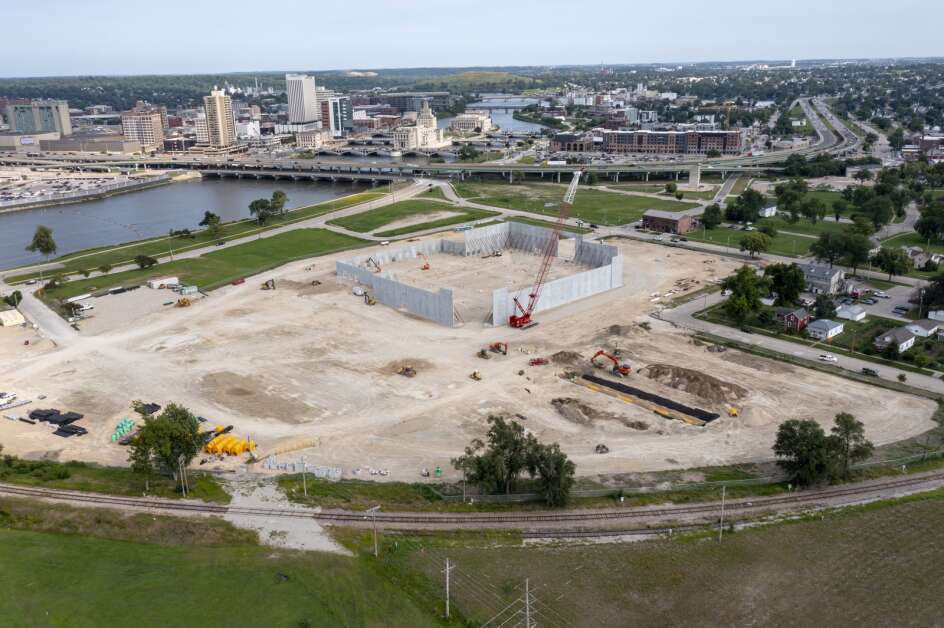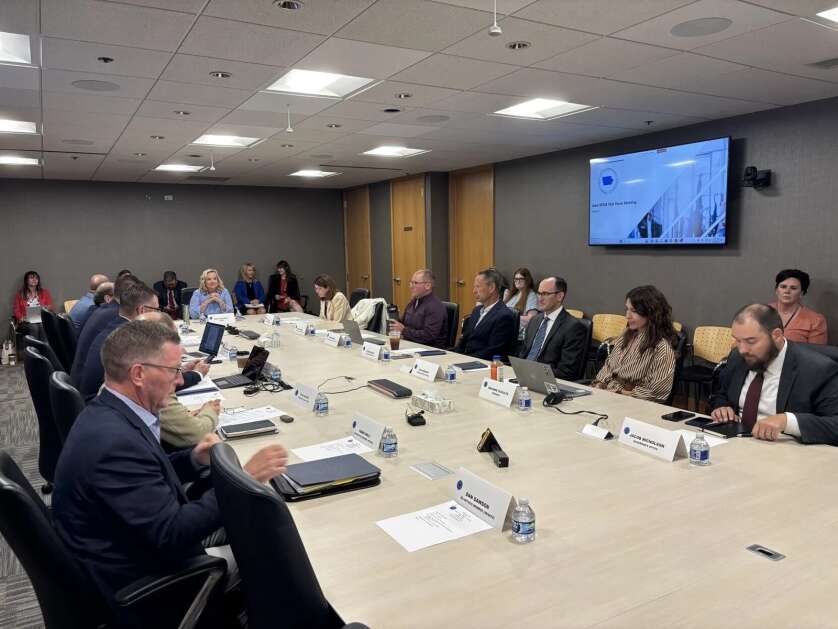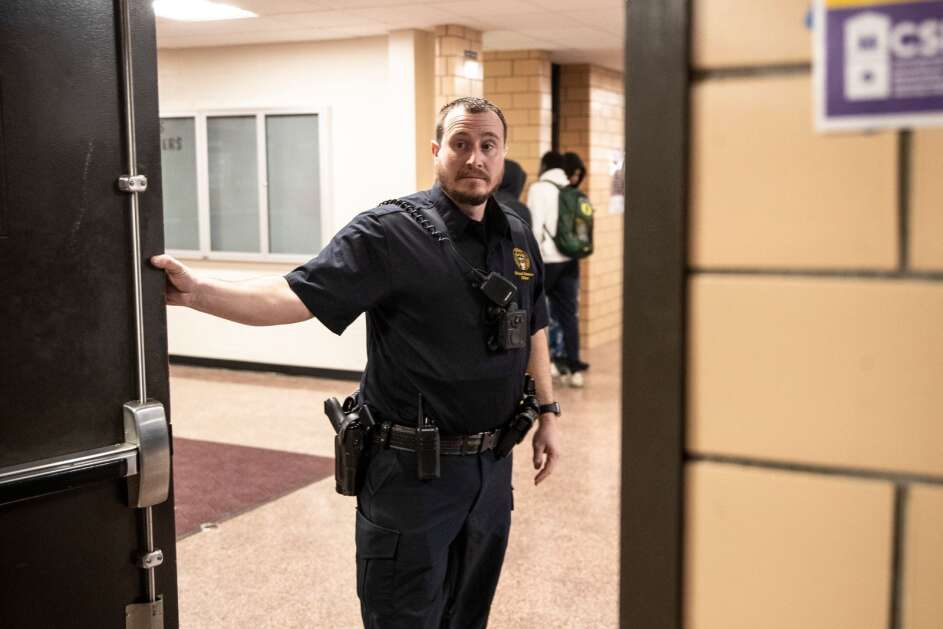The Gazette offers audio versions of articles using Instaread. Some words may be mispronounced.
DES MOINES — Iowa’s elected leaders present and past are discussing a back-and-forth within President Donald Trump’s administration about how to manage farm labor amid a hard-line deportation policy.
During
an event at the Iowa State Fairgrounds last week
, Trump said he was working on a policy that would allow farmworkers without legal status to stay in the country with support from their employers.
Earlier this week, Trump’s ag secretary, Brooke Rollins, appeared to walk back Trump’s comments, saying there will be “no amnesty” for agricultural workers from mass deportations, which will continue “but in a strategic way.”
U.S. agriculture producers have warned that mass deportations of farmworkers will negatively impact farms and agricultural businesses in the country by depleting their workforce.
From separate events Thursday, Gov. Kim Reynolds, Congresswoman Ashley Hinson, and Tom Vilsack — the former Iowa governor and USDA secretary — all discussed the issue.
Trump said at the Iowa State Fairgrounds event July 3 that he was working on legislation with U.S. Secretary of Agriculture Brooke Rollins and U.S. Secretary of Homeland Security Kristi Noem that would aid impacted businesses and farms by allowing employers to vouch for their undocumented employees to allow them to remain in the country.
“If a farmer is willing to vouch for these people in some way, Kristi, I think we’re going to have to just say that’s going to be good, right?” Trump said, adding later, “We don’t want to do it where we take all of the workers off the farms.”
Rollins, however, walked back Trump’s proposal on Tuesday after receiving blow back from the president’s most ardent supporters, who have criticized the administration for giving special treatment to farms.
Speaking to reporters
at a news conference Tuesday, Rollins said there will be “no amnesty” for agricultural workers from mass deportations, which will continue “but in a strategic way.” Rollins
told reporters
that she thinks Medicaid work requirements — included in Trump’s agenda-setting tax and spending bill — and automation could replace threatened migrant farmworkers.
In 2023, nearly two-thirds of adults ages 19-64 covered by Medicaid were working full- or part-time. Nearly three in 10 were not working because of caregiving responsibilities, illness or disability, or due to school attendance, according to a
May brief by the health policy organization KFF
.
“I think the secretary has suggested that Medicaid-eligible, able-bodied folks on Medicaid would be in a position to take these jobs. I think she’s going to find that that’s not as easy as she may think,” Vilsack said Thursday while taping his appearance on this weekend’s episode of “Iowa Press” on Iowa PBS.
Rollins said the Trump administration is focused on protecting the U.S. food supply in the short term, and that the administration’s “promise to America to ensure that we have a 100 percent American workforce stands, but we must be strategic in how we are implementing the mass deportation so as not to compromise our food supply.”
What Gov. Reynolds said
Speaking to reporters after a public groundbreaking ceremony in Des Moines, Reynolds said her office has reached out to the U.S. Department of Agriculture that Rollins leads to request Iowa leaders be involved in discussions of the Trump administration’s deportation policies as they relate to farmworkers.
“I’ve had my chief of staff reach out to USDA and just let them know this is a really important issue for Iowa agriculture, and we’d like to be a part of it,” Reynolds said. She added later, “What they’re saying is ‘no amnesty,’ but we have to figure out what that looks like and what are some different options that we could utilize to help workforce when it comes to the agriculture industry.”
When asked what Reynolds would tell the administration if given the opportunity to weigh in, the governor said she would like to know what policies are “on the table” and that she will discuss the topic with Iowa agriculture Sec. Mike Naig. Reynolds also said Trump’s immigration and deportation policies have “created a different environment” where issues like farm labor can be discussed.
“What we’ve seen since President Trump was sworn in as president and really made that a No. 1 focus, and as they continue to remove some of the criminals and bad people that they’re trying to remove, then it just creates a different environment where you can, I think, have some of those healthy discussions to see what that looks like,” Reynolds said. “We’ll just have to work with them and see if we can come up with some different solutions.”
What Rep. Hinson said
During a conference call Thursday with Iowa reporters, Hinson, of Marion, said she cares deeply about protecting the integrity of the U.S. food supply and supports legal pathways for people to work in critical industries like agriculture while addressing illegal immigration.
“I think what’s most important is we work toward a solution that provides a legal immigration workforce visa,” she said. “So this is a workforce visa, not an amnesty issue, and we need to make sure we have those legal pathways for people to come here to work in critical industries like agriculture. …
“Again, I think you can couple dealing with the deportation side with illegal immigration at the same time providing pathways for people to come here and work legally. And I look forward to working with them to make sure we’re finding the right balance there.”
What former Gov. Vilsack said
Discussing the issue for this weekend’s episode of “Iowa Press,” Vilsack said mass deportations will make it more difficult for farmers who are reliant on migrant workers to produce food. He said the impact will be especially felt in the dairy industry.
Vilsack said a policy solution has been on the table since 2021: the Farm Workforce Modernization Act, which passed the Democrat-majority U.S. House with bipartisan support — 30 House Republicans (although none of Iowa’s) joined nearly all Democrats in voting for the bill — but stalled in the U.S. Senate.
The bill would have allowed undocumented immigrants working in agriculture to receive Certified Agricultural Worker Status and, eventually, Lawful Permanent Resident status. The Congressional Budget Office estimated more than 300,000 workers and roughly 200,000 of their dependents would have received Certified Agricultural Worker Status.
The bill also would have changed the temporary agricultural worker program, resulting in roughly 200,000 additional undocumented workers receiving status over a decade; and would have increased by 40,000 the number of people able to receive employment-based green cards, according to CBO.
“Perhaps they have to acknowledge that they came into this country improperly by paying a fine. They are given the opportunity to continue working on the farm under certain conditions, and they are able to get gain citizenship after a 10 year or more process,” Vilsack said. “So, there is a way of doing this, and there was significant support for this in farm country.”
C
omments: (319) 398-8499; [email protected]






